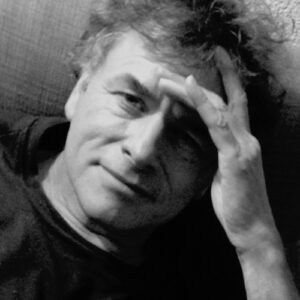
Once again, I’m in rehearsal and there’s a delay as an actor stops midline and says, “Why do I say this? I just can’t wrap my head around it. What is the character’s motivation?” While the cast waits, the actor and director analyze beats, given circumstances, affective memories, and what-ifs. Fifteen minutes later the deadlocked director says, “Hold on a sec, we have the playwright right here, let’s ask him.” I stir in the dark auditorium and join the conversation using Stanislavski’s accepted jargon, even though when I created the character I never considered Stanislavski, I was thinking Ivanka Trump.
If someone perceives something to be true, it is more important than if it is in fact true.” David Hume the Scottish enlightenment philosopher wrote something similar, “The mind is a kind of theatre, where several perceptions successively make their appearance; pass, re-pass, glide away, and mingle in an infinite variety of postures and situations… [These] successive perceptions constitute the mind… and the identity of a self.” (A Treatise of Human Nature)
But a single passing perception doesn’t make a character. For perception to generate into character, similar perceptions must recur for an extended period. When this happens perceptions become entrenched and the character inflexible, no longer open to or affected by new perceptions. At this point of saturation a character, consciously or unconsciously, sets out to find and/or manufacture those unifying perceptions that reaffirm their identity and their reaction to those perceptions becomes a habitual mode of response.
For example, Madame Ranevskaya in The Cherry Orchard has lived most of her life as a wealthy landowner. As the play begins, she’s nearly destitute, but her perception of wealth has been so unfailing that she cannot perceive her new life. What is Ranevskaya’s psychological motivation for not seeing reality? Simple, she’s human, and all humans, as T.S. Eliot said, “cannot bear reality.” (The Four Quartets). So we gerrymander a patchwork of perceptions that become our identity. Character is a comfortable distortion of reality. And once we’ve created that comfortable distortion, there is no limit to the amount of evidence we can overlook to protect our identity.
Another example is Oedipus – are you telling me he cannot see that his middle-aged wife is also his mother? What, is he blind? Yes. We’re all blind. And our particular type of blindness defines who we are. John Locke wrote, “Earthly minds, like mud walls, resist the strongest batteries, and though perhaps sometimes the force of a clear argument may make some impression, yet they nevertheless stand firm, keep out the enemy truth, that would captivate or disturb them.” (An Essay Concerning Human Understanding). We are all committed to our perceptions, our distorted fragment of a fragment of reality – in other words, our character.
My problem with many of the current acting systems is that they make some actors and directors into junior Freudians who spend rehearsals psychoanalyzing a character as if it were sitting on a couch on the other side of the room.
A character in a play doesn’t understand his or her deep psychological motivations so why should the actor? (I realize that last sentence will cause much disagreement, but please hear me out.) Knowing the character’s detailed psychological motivations distances the actor from the character, while hearing what the character hears and seeing what the character sees joins the actor and the character.
There’s a break in rehearsal. I find my way to the green room where a man rushes in from the rain. He obviously works here. After introducing myself, I ask, “Do you know where I’d find coffee?” He tersely answers, “That’s not my job.” Again, we have no history. Why would he say this to a complete stranger? What is his motivation? Too often we think a character’s behavior is not fully explained until we uncover his or her deepest motivations. After every mass shooting newscasters try to guess at the gunman’s “possible motive.” After a magnificent bases-loaded home run the baseball star turns to the camera and states he was motivated by little Bobby’s fight with cancer. We are all looking for causality (like Aristotle), but when we find the sacred motivation do we really understand it? If we say that a tree’s motivation for falling is gravity, does that mean we understand gravity?
I want to analyze the rude man’s motivation psychologically. But instead, I ask myself, “What did he hear me say?” He did not hear, “Do you know where I’d find coffee?” He heard, “Hey you, where’s the coffee” or perhaps “You’re not doing anything, make coffee.” Understanding what he heard me say is the key to his character. Why he heard what he heard, instead of what I said (or what I perceived I said) does involve given circumstances; perhaps he broke up with his significant other over coffee, or he had a bad experience with a caffeine-starved playwright. But none of these can be played at the moment, no actor is good enough to say the line, “That’s not my job” and have the audience inherently know the character once had a wicked childhood potty training experience in the bathroom of a Starbucks while his mother drank a Caramel Macchiato. All we know is that he is true to himself, in other words, his perceptions.
Giving up on the coffee I head back to rehearsal; the rude man stops me and says, “Sorry, I had a bad day.” And then he launches into a monologue about how his car failed to start, and he had to take a bus, which was late, so the artistic director yelled at him. Also, his cat died last week. What is his motivation for saying this? Simple. Exposition.
Writers and directors are often overly concerned with exposition, in particular, the dreaded obvious exposition. But in fact life is brimming with obvious exposition – just strike up a conversation with an American on an international flight.
Exposition is almost always a one-way street. It is a character attempting to convince another of their personal truth. It is not an attempt to listen to other realities. As Rupert Crawshay-Williams writes, “In most differences of opinion the parties concerned are so passionately absorbed in the effort to remember all the evidence in their own favour that they have no room in their minds for any other consideration.” (The Comfort of Unreason, A Study of the Motives behind Irrational Thoughts). We are all trying to convince others that our subjective POV, our “Weltanschauung” as Freud would call it, applies to the objective world. It seldom does. Exposition is given circumstances verbalized. The exposition we divulge may be fact, fiction, fake news, or a false memory; it doesn’t matter. We are all saying, “If you saw the world as I do, you would do what I’ve done, or what I’m about to do.”
I walk back into rehearsal. The director and actor are now questioning if the character is “impeding his ego from seeking gratification by limiting his id.” Rehearsal has become surreal. What does “surreal” mean? We have a surreal moment when we face a perception that we cannot ignore and yet have no prior perceptions to help us understand. It’s difficult to be yourself (your character) in a surreal situation. For example, birth for a baby is surreal because they have no unified perceptions to help them understand what the hell is going on.
In a perfect world writers, directors and actors would be able to search their character, clearly identify those perceptions they favor, unmask their tendency to find only those perceptions that support their character and then discount those perceptions as part of their human tendency to assume that they are correct. But I have little hope for this because actors, directors, and writers (just like characters) seldom question their perceptions. So the best we can do is to use our imaginations, not perceptions, to understand a character.
Yes, most of the time, but not always. Creative people can imagine ideas, concepts, stories and perceptions that they have not experienced. If we only used our sense memories, and not our imaginations, there would be no light bulbs or candy corn flavored Oreos.
The director and actor are now debating the character’s arc. What is a character arc? Simple. An arc happens at that rare instant when a character allows a new perception into their fixed world. This changes their character, and thus what actions they take. Such moments are theatrical magic but rare in real life.
It is now midnight; the actor and director have circled back to the beginning. The actor shakes his head and says, “I still can’t wrap my head around this character.” Perhaps it’s the late hour, or the lack of coffee, or the fact that my cat is dying, whatever my motivation, I finally say what I must, “What do you mean by ‘I’? If you mean yourself then you’re right, you are not the character; you perceive life differently. If you mean ‘I’ the character, then you are failing as an actor because you (the actor) are not using your imagination to limit or expand your perceptions to see from the character’s POV. You cannot understand a character or a human by forcing your perceptions on them; you must become them by limiting yourself to or by acquiring their perceptions. This takes imagination, and this is why imagination is more important than motivation!”
The actor thoughtfully considers and says, “I hear ya. And because of what you said, do you know what I’m going to do? Tonight, after rehearsal, I’m going to the library and looking up what Stanislavski wrote about early childhood potty training.” And thus the actor (just like Madame Ranevskaya and Oedipus) remains true to his perception, his character.
“The Moment Before”: Why We Do Theatre
Design: Moving Through Creative Block


William Missouri Downs has had 150 productions of his plays from the Kennedy Center to the San Diego Rep and won numerous playwriting awards including two rolling premieres from the National New Play Network. He’s twice been a finalist at the Eugene O’Neill. He’s published four books on playwriting, screenwriting and the art of theatre. Samuel French and Playscripts have published his plays. He’s also been produced in Spain, South Africa, Singapore, Switzerland, Austria, Israel, India, Russia, and South Korea. In addition he has written for several NBC sitcoms.
Read Full Profile© 2021 TheatreArtLife. All rights reserved.

Thank you so much for reading, but you have now reached your free article limit for this month.
Our contributors are currently writing more articles for you to enjoy.
To keep reading, all you have to do is become a subscriber and then you can read unlimited articles anytime.
Your investment will help us continue to ignite connections across the globe in live entertainment and build this community for industry professionals.